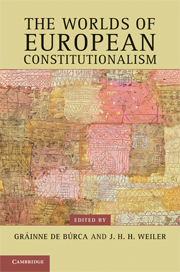Book contents
- Frontmatter
- Contents
- Contributors
- Introduction
- Prologue: global and pluralist constitutionalism – some doubts
- 1 The European Union as an international legal experiment
- 2 The place of European law
- 3 The ECJ and the international legal order
- 4 Local, global and plural constitutionalism
- 5 The case for pluralism in postnational law
- Dialogical epilogue
- Bibliography
- Index
Prologue: global and pluralist constitutionalism – some doubts
Published online by Cambridge University Press: 05 June 2012
- Frontmatter
- Contents
- Contributors
- Introduction
- Prologue: global and pluralist constitutionalism – some doubts
- 1 The European Union as an international legal experiment
- 2 The place of European law
- 3 The ECJ and the international legal order
- 4 Local, global and plural constitutionalism
- 5 The case for pluralism in postnational law
- Dialogical epilogue
- Bibliography
- Index
Summary
Global Constitutionalism and Constitutional Pluralism:
Like an infectious virus which simply develops new resistant strains when we think we finally have it under control, so it is with <Constitutional> <kɒnstɪ’tuʃənl>. The most recent academic pandemic, particularly virulent (cerebral indigestion being one of its milder symptoms) is the result of a genetic fusion of the ubiquitous Global Constitutionalism and Constitutional Pluralism strains which dominated the 1990s and 2010s. Global Constitutionalism is already, at least in the eyes of some, a discrete academic discipline, with a soon to be published Journal of Global Constitutionalism, with various masters’ degrees, treatises and the other usual accoutrements. Constitutional Pluralism is today the only party membership card which will guarantee a seat at the high tables of the public law professoriate. From my vantage point of editor-in-chief of the deliciously and ambiguously entitled International Journal of Constitutional Law (I∙CON) I have begun to wonder: Is there anyone out there who is not a constitutional pluralist? Who does not believe that the global space is in some form constitutionalized?
I do not recall ever using constitutional pluralism in my own writing, but like M. Jourdain, I was instructed that I too, apparently, converse in the prose of constitutional pluralism, which, paradoxically makes me (and everyone else) a comfortable Bourgeois gentilhomme. That, of course, is the price of success of a concept/fad: what begins as heterodoxy becomes prevailing orthodoxy, in this case when Constitutional Pluralism (the maverick constitutional pluralism strain) suddenly emerges as hopelessly politically correct.
- Type
- Chapter
- Information
- The Worlds of European Constitutionalism , pp. 8 - 18Publisher: Cambridge University PressPrint publication year: 2011
- 33
- Cited by

